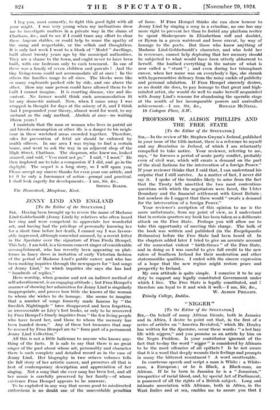JENNY LIND AND ENGLAND
[To the Editor of the SPECTATOR.] SIR,---Having been brought up to revere the name of Madame Lind-Goldschmidt (Jenny Lind) by relatives who often heard her sing and were competent to appreciate her wonderful art, and having had the privilege of personally knowing her for a short time before her death, I cannot say I was favour- ably impressed, although somewhat amused, by a recent letter in the Spectator over the signature of Frau Freda Hempel. This lady, I am told, is a German concert singer of considerable accomplishment, who has recently been appearing on plat- forms in fancy dress in imitation of early Victorian fashion of the period of Madame Lind's public career and who has been making inquiries through the newspapers for " lost songs of Jenny Lind," to which inquiries she says she has had
hundreds of replies."
Hero worship, when genuine and not an indirect method of self-advertisement, is an engaging attitude ; but Frau Hempel's manner of showing her admiration for Jenny Lind is singularly inappropriate, and proves how little she knows of the woman to whom she wishes to do homage. She seems to imagine that a number of songs formerly made famous by " the Swedish Nightingale " have disappeared and been forgotten, as irrecoverable as Livy's lost books, or only to be recovered by Frau Hempel's timely inquiries from " the few living people who have heard her, and those to whom the memory has been handed down." Any of these lost treasures that may be rescued by Frau Hempel are to " form part of a permanent Jenny Lind Collection."
All this is not a little ludicrous to anyone who knows any- thing of the facts. It is safe to say that there is no great singer of the past about whose art, personality and character there is such complete and detailed record as in the case of Jenny Lind. Her biography in two octavo volumes tells ti'e full story of her artistic career, and preserves all that is best of contemporary description and appreciation of her singing. Not a song that she ever sang has been lost, and all her music is carefully preserved by her family—of whose existence Frau Hempel appears to be unaware.
To be exploited in any way that seems good to misdirected enthusiasm is no doubt one of the unavoidable penalties
of fame. If Frau Hempel thinks she can show honour to Jenny Lind by singing a song in a crinoline, no one has any more right to prevent her than to forbid any platform reciter to spout Shakespeare in Elizabethan ruff and doublet, or Byron in a green waistcoat and loose cravat, by way of homage to the poets. But those who know anything of Madame Lind-Goldschmidt's character, and who hold her in reverence, cannot help deploring that her memory should be subjected to what would have been utterly abhorrent to herself. She loathed everything in the nature of what is now called a " stunt " ; and even during her triumphant career, when her name was on everybody's lips, she shrank with hypersensitive delicacy from the noisy cackle of publicity and personal adulation. If Frau Hempel sincerely desires, as no doubt she does, to pay homage to that great and high- minded artist, she would do well to make herself acquainted with Jenny Lind's reasons for abandoning the operatic stage at the zenith of her incomparable powers and unrivalled


























































 Previous page
Previous page